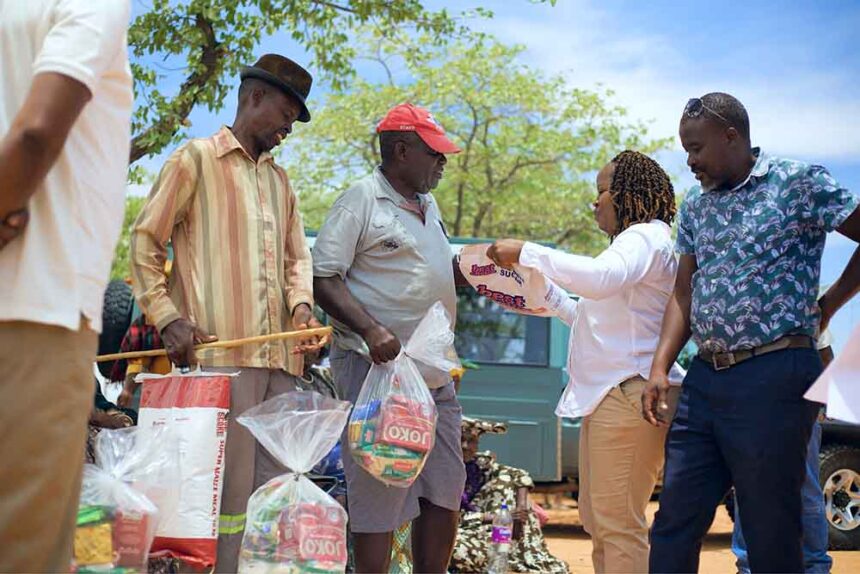Kaviveterue Virere
Otniel Hembapu
The Namibian government has officially concluded its nationwide drought relief programme for the 2024/25 period.
In a ministerial statement delivered to Parliament last Thursday, Prime Minister Elijah Ngurare announced the end of the programme, which was launched in response to one of the most severe droughts in the country’s history. The drought was driven by the El Niño weather phenomenon which brought below-average rainfall to the country during the 2023/24 agricultural season.
During this crisis period, approximately 384 935 households were declared food insecure, and more than 1 100 Namibians, mostly children, lost their lives due to malnutrition with Omaheke the worst-affected region.
In response, the government rolled out the drought relief programme to more than 1.4 million people across all 14 regions of the country. However, Ngurare informed Parliament that given the above-normal rainfall received across the country, this year’s harvest has been favourable and is expected to sustain households until the next harvesting season.
He said the condition of pastures have also significantly improved and are sufficient to sustain livestock over the same period. “Given these positive developments, the Office of the Prime Minister will now advocate the continued mainstreaming of disaster risk reduction initiatives at all levels.
“The government will embark on targeted resilience-building programmes, in collaboration with all line ministries and development partners, to enhance food production through the drilling of boreholes, excavation of earth dams, and the diversification of livelihoods,” said Ngurare.
Although the programme has officially ended, follow-up activities are ongoing to address outstanding needs. Ngurare expressed gratitude to all stakeholders, regional councils, government offices, and development partners for their collaboration and commitment throughout the recently concluded operation.
A recent report states that the United Nations Food and Agriculture Organisation (FAO) and the World Food programme (WFP) have officially removed Namibia from the 2025 global Hunger Hotspot list, alongside regional neighbours such as Lesotho, Malawi, Mozambique, Zambia and Zimbabwe.
On 22 May 2024, former President Nangolo Mbumba declared a State of Emergency on hunger and Cabinet subsequently approved a N$1.3 billion drought relief plan, which was implemented from 1 July 2024 to 30 June 2025.
The relief efforts focused on several key interventions, including food assistance to vulnerable households, livestock support, seed and horticulture provision, and the provision of water.
Various donations, both in cash and in kind, were received to support the programme. To date, a total of N$1.2 million in cash and food items valued at N$793 858.57 have been received from local companies and individuals. International donors, including the State of Qatar, the People’s Republic of China and the Republic of India, have contributed approximately N$160 million worth of food items.
“Furthermore, Algeria and Malaysia contributed cash donation of over N$17 million and more than N$710 000 respectively. Additional donations of N$26 million were received and implemented through various implementing entities such World Food Programme and the Namibia Red Cross Society,” he added.
Despite the programme’s successes, Ngurare acknowledged significant implementation challenges which included delays and backlogs in food distribution, a lack of transport, shortages of warehouse facilities, unavailability of maize meal in the country, human resource constraints, and theft of drought relief commodities.
“All cases of theft were reported to the Namibian police,” the Prime Minister said.
A least six cases of drought relief food theft from the Oshikoto, Otjozondjupa, Ohangwena, Kavango West and Zambezi regions are being investigated by the police.
Ngurare said measures had been put in place for regional councils to complete the outstanding food distributions by 31 August 2025.
Distribution
The Government introduced a food voucher system that was successfully rolled out in Oshana, Khomas, Omaheke, //Kharas, Hardap, Kavango West, Kavango East, Kunene, and Oshikoto regions, with a total 144 930 households redeeming them at 493 contracted retailers as of June 2025.
The livestock support programme, which was implemented from October 2023 to March 2025 was allocated N$100 million with another N$25 million spent on subsidising farmers through the agriculture ministry. The subsidies included livestock marketing incentives, lease of grazing, transportation to/from grazing areas and purchasing of fodder and licks.
On water provision, Ngurare said a total of N$100 million was allocated for water projects under the drought relief programme and to date, more than N$99.7 million had been spent on key projects, including the Onamatanga water pipeline which is 99% complete and the drilling, rehabilitation and installation of 42 boreholes across various regions.
ohembapu@nepc.com.na



